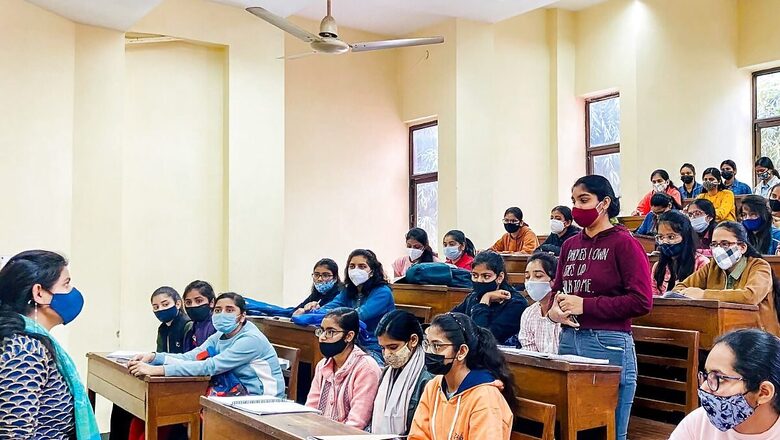
views
Tamil Nadu, Andhra Pradesh, Maharashtra, Telangana and Karnataka are the top five states with the highest number of autonomous colleges affiliated to universities. However, bigger states like Uttar Pradesh, Rajasthan and Madhya Pradesh, among others, lag far behind in this measure. Even as the University Grants Commission (UGC) brought out rules for universities to allow autonomy to affiliated colleges in 2023 in line with the new National Education Policy, most state universities are yet to follow the norm, according to data compiled by the higher education regulator.
The UGC had last April come out with rules titled ‘Regulation on Conferment of Autonomous Status Upon Colleges and Measures for Maintenance of Standards in Autonomous Colleges’ that laid out criterion to seek fresh or extended autonomous status to colleges. These rules superseded the previous guidelines of 2018. The norms were launched in line with the NEP, 2020, that envisages that every college would develop into either an ‘autonomous degree-granting college’, or a constituent college of a university.
Being an autonomous college means having greater control over academic as well as administrative decision-making where these institutions can develop their own curriculum, set question papers, publish results and formulate their own policies.
According to UGC data, there are more than 252 autonomous colleges in Tamil Nadu, 197 in Maharashtra, 165 in Andhra Pradesh, 124 in Telangana and 83 in Karnataka.
This is followed by other states including Kerala (33), Madhya Pradesh (23), West Bengal (19), Odisha (16), Gujarat (13), Chhattisgarh (12), and Punjab (12).
UGC chairperson M Jagadesh Kumar said that while most states are yet to allow colleges the opportunity to emerge as autonomous, the commission plans to hold discussions with vice-chancellors (V-Cs) of universities to push the agenda on autonomy.
“We plan to conduct a meeting with V-Cs of universities to know their difficulties in the process. UGC also expects active role of the State Higher Educational Councils to ensure implementation of the regulations. An autonomous status provides freedom to the colleges to restructure and redesign the existing courses. They can also introduce new courses that cater to the needs of the industry. Universities can innovate teaching-learning processes and outcome-based learning. The institutions can evolve newer methods of assessment of students’ performance. They can also offer diploma and certificate courses,” said Kumar.
Since the launch of the regulations in 2023, the UGC has received applications from over 590 colleges seeking for ‘autonomous’ status. Of these, the commission reviewed and approved more than 460 applications. “The new regulations provide a simplified and transparent mechanism for conferring autonomous status to colleges. All colleges currently affiliated to a university shall attain the required benchmarks over time to secure the prescribed accreditation benchmarks and eventually become autonomous degree-granting colleges,” he said.
Challenges Faced by Colleges
Colleges, in many cases, even after having received the autonomous status, face challenges, which mostly lie with universities including delays in responding to applications. “It appears that at times universities have concerns over allowing complete autonomy to the colleges in the matter of designing syllabus, introduction of new courses and evolving methods of student performance. It is also noticed that in some cases universities collect affiliation fees from the colleges against the regulations,” said a senior UGC official.
There are also some cases where universities restrict the nature of the autonomy by allowing only 25%-35% of syllabus change for the autonomous colleges, the official added.
A senior faculty from a state-run college in UP said that even though autonomy means greater academic flexibility for institutions, universities are not ready to allow colleges have complete control in developing curriculum and setting question papers. “Often it is the case that university exam results are delayed due to multiple factors and students have to wait for long before they could apply for higher studies or a job. This is not the case when a college is autonomous and can hold exams and publish results without having to wait for the university schedule,” the faculty member said not wishing to be named.
News18 has sent a query to several state universities seeking their response on the issue. This story will be updated if and when a response is received.
NIRF Rankings Show Autonomous Colleges on Top
The National Institutional Ranking Framework (NIRF) 2023 shows that in the ‘colleges’ category, from the rank 1-100, 55 colleges are those with an autonomous status.
In the ‘engineering’ category too, most of the top-ranking colleges are autonomous. In the ranks 1-100, six colleges have autonomous status including the Indian Institutes of Technology (IITs) and National Institutes of Technology (NITs), among others.




















Comments
0 comment